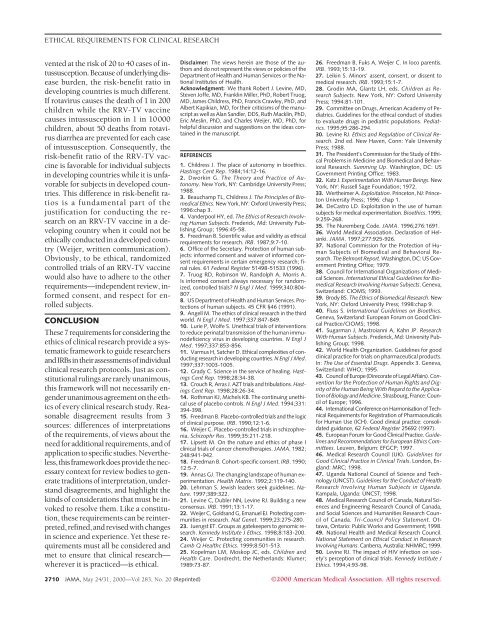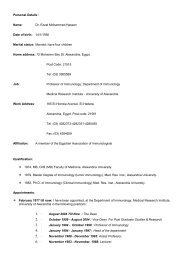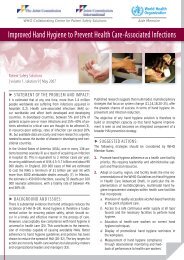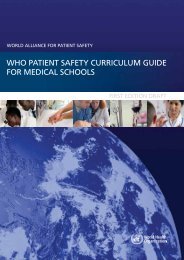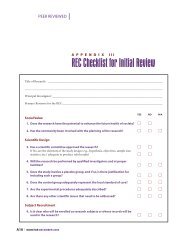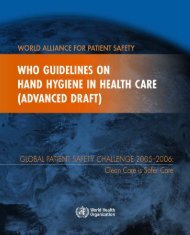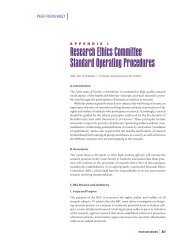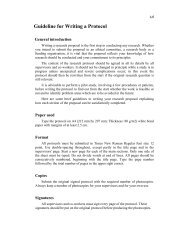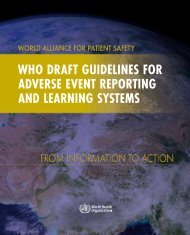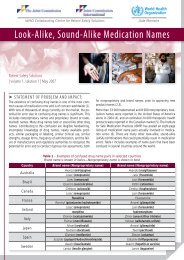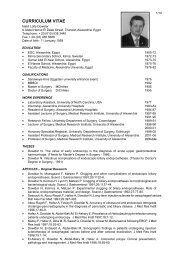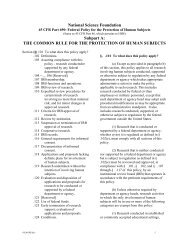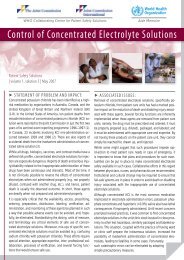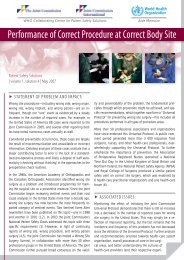What Makes Clinical Research Ethical? - Forum of Ethics Review ...
What Makes Clinical Research Ethical? - Forum of Ethics Review ...
What Makes Clinical Research Ethical? - Forum of Ethics Review ...
You also want an ePaper? Increase the reach of your titles
YUMPU automatically turns print PDFs into web optimized ePapers that Google loves.
ETHICAL REQUIREMENTS FOR CLINICAL RESEARCH<br />
vented at the risk <strong>of</strong> 20 to 40 cases <strong>of</strong> intussusception.<br />
Because <strong>of</strong> underlying disease<br />
burden, the risk-benefit ratio in<br />
developing countries is much different.<br />
If rotavirus causes the death <strong>of</strong> 1 in 200<br />
children while the RRV-TV vaccine<br />
causes intussusception in 1 in 10000<br />
children, about 50 deaths from rotavirus<br />
diarrhea are prevented for each case<br />
<strong>of</strong> intussusception. Consequently, the<br />
risk-benefit ratio <strong>of</strong> the RRV-TV vaccine<br />
is favorable for individual subjects<br />
in developing countries while it is unfavorable<br />
for subjects in developed countries.<br />
This difference in risk-benefit ratios<br />
is a fundamental part <strong>of</strong> the<br />
justification for conducting the research<br />
on an RRV-TV vaccine in a developing<br />
country when it could not be<br />
ethically conducted in a developed country<br />
(Weijer, written communication).<br />
Obviously, to be ethical, randomized<br />
controlled trials <strong>of</strong> an RRV-TV vaccine<br />
would also have to adhere to the other<br />
requirements—independent review, informed<br />
consent, and respect for enrolled<br />
subjects.<br />
CONCLUSION<br />
These7requirementsforconsideringthe<br />
ethics <strong>of</strong> clinical research provide a systematic<br />
framework to guide researchers<br />
andIRBsintheirassessments<strong>of</strong>individual<br />
clinical research protocols. Just as constitutional<br />
rulings are rarely unanimous,<br />
this framework will not necessarily engenderunanimousagreementontheethics<br />
<strong>of</strong> every clinical research study. Reasonable<br />
disagreement results from 3<br />
sources: differences <strong>of</strong> interpretations<br />
<strong>of</strong> the requirements, <strong>of</strong> views about the<br />
need for additional requirements, and <strong>of</strong><br />
application to specific studies. Nevertheless,thisframeworkdoesprovidethenecessary<br />
context for review bodies to generate<br />
traditions <strong>of</strong> interpretation, understand<br />
disagreements, and highlight the<br />
kinds <strong>of</strong> considerations that must be invoked<br />
to resolve them. Like a constitution,<br />
these requirements can be reinterpreted,refined,andrevisedwithchanges<br />
in science and experience. Yet these requirements<br />
must all be considered and<br />
met to ensure that clinical research—<br />
wherever it is practiced—is ethical.<br />
Disclaimer: The views herein are those <strong>of</strong> the authors<br />
and do not represent the views or policies <strong>of</strong> the<br />
Department <strong>of</strong> Health and Human Services or the National<br />
Institutes <strong>of</strong> Health.<br />
Acknowledgment: We thank Robert J. Levine, MD,<br />
Steven J<strong>of</strong>fe, MD, Franklin Miller, PhD, Robert Truog,<br />
MD, James Childress, PhD, Francis Crawley, PhD, and<br />
Albert Kapikian, MD, for their criticisms <strong>of</strong> the manuscript<br />
as well as Alan Sandler, DDS, Ruth Macklin, PhD,<br />
Eric Meslin, PhD, and Charles Weijer, MD, PhD, for<br />
helpful discussion and suggestions on the ideas contained<br />
in the manuscript.<br />
REFERENCES<br />
1. Childress J. The place <strong>of</strong> autonomy in bioethics.<br />
Hastings Cent Rep. 1984;14:12-16.<br />
2. Dworkin G. The Theory and Practice <strong>of</strong> Autonomy.<br />
New York, NY: Cambridge University Press;<br />
1988.<br />
3. Beauchamp TL, Childress J. The Principles <strong>of</strong> Biomedical<br />
<strong>Ethics</strong>. New York, NY: Oxford University Press;<br />
1996:chap 3.<br />
4. Vanderpool HY, ed. The <strong>Ethics</strong> <strong>of</strong> <strong>Research</strong> Involving<br />
Human Subjects. Frederick, Md: University Publishing<br />
Group; 1996:45-58.<br />
5. Freedman B. Scientific value and validity as ethical<br />
requirements for research. IRB. 1987;9:7-10.<br />
6. Office <strong>of</strong> the Secretary. Protection <strong>of</strong> human subjects:<br />
informed consent and waiver <strong>of</strong> informed consent<br />
requirements in certain emergency research; final<br />
rules. 61 Federal Register 51498-51533 (1996).<br />
7. Truog RD, Robinson W, Randolph A, Morris A.<br />
Is informed consent always necessary for randomized,<br />
controlled trials? N Engl J Med. 1999;340:804-<br />
807.<br />
8. US Department <strong>of</strong> Health and Human Services. Protections<br />
<strong>of</strong> human subjects. 45 CFR §46 (1991).<br />
9. Angell M. The ethics <strong>of</strong> clinical research in the third<br />
world. N Engl J Med. 1997;337:847-849.<br />
10. Lurie P, Wolfe S. Unethical trials <strong>of</strong> interventions<br />
to reduce perinatal transmission <strong>of</strong> the human immunodeficiency<br />
virus in developing countries. N Engl J<br />
Med. 1997;337:853-856.<br />
11. Varmus H, Satcher D. <strong>Ethical</strong> complexities <strong>of</strong> conducting<br />
research in developing countries. N Engl J Med.<br />
1997;337:1003-1005.<br />
12. Grady C. Science in the service <strong>of</strong> healing. Hastings<br />
Cent Rep. 1998;28:34-38.<br />
13. Crouch R, Arras J. AZT trials and tribulations. Hastings<br />
Cent Rep. 1998;28:26-34.<br />
14. Rothman KJ, Michels KB. The continuing unethical<br />
use <strong>of</strong> placebo controls. N Engl J Med. 1994;331:<br />
394-398.<br />
15. Freedman B. Placebo-controlled trials and the logic<br />
<strong>of</strong> clinical purpose. IRB. 1990;12:1-6.<br />
16. Weijer C. Placebo-controlled trials in schizophrenia.<br />
Schizophr Res. 1999;35:211-218.<br />
17. Lipsett M. On the nature and ethics <strong>of</strong> phase I<br />
clinical trials <strong>of</strong> cancer chemotherapies. JAMA. 1982;<br />
248:941-942.<br />
18. Freedman B. Cohort-specific consent. IRB. 1990;<br />
12:5-7.<br />
19. Annas GJ. The changing landscape <strong>of</strong> human experimentation.<br />
Health Matrix. 1992;2:119-140.<br />
20. Lehrman S. Jewish leaders seek guidelines. Nature.<br />
1997;389:322.<br />
21. Levine C, Dubler NN, Levine RJ. Building a new<br />
consensus. IRB. 1991;13:1-17.<br />
22. Weijer C, Goldsand G, Emanuel EJ. Protecting communities<br />
in research. Nat Genet. 1999;23:275-280.<br />
23. Juengst ET. Groups as gatekeepers to genomic research.<br />
Kennedy Institute J <strong>Ethics</strong>. 1998;8:183-200.<br />
24. Weijer C. Protecting communities in research.<br />
Camb Q Healthc <strong>Ethics</strong>. 1999;8:501-513.<br />
25. Kopelman LM, Moskop JC, eds. Children and<br />
Health Care. Dordrecht, the Netherlands: Klumer;<br />
1989:73-87.<br />
26. Freedman B, Fuks A, Weijer C. In loco parentis.<br />
IRB. 1993;15:13-19.<br />
27. Leikin S. Minors’ assent, consent, or dissent to<br />
medical research. IRB. 1993;15:1-7.<br />
28. Grodin MA, Glantz LH, eds. Children as <strong>Research</strong><br />
Subjects. New York, NY: Oxford University<br />
Press; 1994:81-101.<br />
29. Committee on Drugs, American Academy <strong>of</strong> Pediatrics.<br />
Guidelines for the ethical conduct <strong>of</strong> studies<br />
to evaluate drugs in pediatric populations. Pediatrics.<br />
1995;95:286-294.<br />
30. Levine RJ. <strong>Ethics</strong> and Regulation <strong>of</strong> <strong>Clinical</strong> <strong>Research</strong>.<br />
2nd ed. New Haven, Conn: Yale University<br />
Press; 1988.<br />
31. The President’s Commission for the Study <strong>of</strong> <strong>Ethical</strong><br />
Problems in Medicine and Biomedical and Behavioral<br />
<strong>Research</strong>. Summing Up. Washington, DC: US<br />
Government Printing Office; 1983.<br />
32. Katz J. Experimentation With Human Beings. New<br />
York, NY: Russell Sage Foundation; 1972.<br />
33. Wertheimer A. Exploitation. Princeton, NJ: Princeton<br />
University Press; 1996: chap 1.<br />
34. DeCastro LD. Exploitation in the use <strong>of</strong> human<br />
subjects for medical experimentation. Bioethics. 1995;<br />
9:259-268.<br />
35. The Nuremberg Code. JAMA. 1996;276:1691.<br />
36. World Medical Association. Declaration <strong>of</strong> Helsinki.<br />
JAMA. 1997;277:925-926.<br />
37. National Commission for the Protection <strong>of</strong> Human<br />
Subjects <strong>of</strong> Biomedical and Behavioral <strong>Research</strong>.<br />
The Belmont Report. Washington, DC: US Government<br />
Printing Office; 1979.<br />
38. Council for International Organizations <strong>of</strong> Medical<br />
Sciences. International <strong>Ethical</strong> Guidelines for Biomedical<br />
<strong>Research</strong> Involving Human Subjects. Geneva,<br />
Switzerland: CIOMS; 1993.<br />
39. Brody BS. The <strong>Ethics</strong> <strong>of</strong> Biomedical <strong>Research</strong>. New<br />
York, NY: Oxford University Press; 1998:chap 9.<br />
40. Fluss S. International Guidelines on Bioethics.<br />
Geneva, Switzerland: European <strong>Forum</strong> on Good <strong>Clinical</strong><br />
Practice/CIOMS; 1998.<br />
41. Sugarman J, Mastroianni A, Kahn JP. <strong>Research</strong><br />
With Human Subjects. Frederick, Md: University Publishing<br />
Group; 1998.<br />
42. World Health Organization. Guidelines for good<br />
clinical practice for trials on pharmaceutical products.<br />
In: The Use <strong>of</strong> Essential Drugs. Appendix 3. Geneva,<br />
Switzerland: WHO; 1995.<br />
43. Council <strong>of</strong> Europe (Direcorate <strong>of</strong> Legal Affairs).Convention<br />
for the Protection <strong>of</strong> Human Rights and Dignity<br />
<strong>of</strong> the Human Being With Regard to the Application<br />
<strong>of</strong> Biology and Medicine. Strasbourg, France: Council<br />
<strong>of</strong> Europe; 1996.<br />
44. International Conference on Harmonisation <strong>of</strong> Technical<br />
Requirements for Registration <strong>of</strong> Pharmaceuticals<br />
for Human Use (ICH). Good clinical practice: consolidated<br />
guidance, 62 Federal Register 25692 (1997).<br />
45. European <strong>Forum</strong> for Good <strong>Clinical</strong> Practice. Guidelines<br />
and Recommendations for European <strong>Ethics</strong> Committees.<br />
Leuven, Belgium: EFGCP; 1997.<br />
46. Medical <strong>Research</strong> Council (UK). Guidelines for<br />
Good <strong>Clinical</strong> Practice in <strong>Clinical</strong> Trials. London, England:<br />
MRC; 1998.<br />
47. Uganda National Council <strong>of</strong> Science and Technology<br />
(UNCST). Guidelines for the Conduct <strong>of</strong> Health<br />
<strong>Research</strong> Involving Human Subjects in Uganda.<br />
Kampala, Uganda: UNCST; 1998.<br />
48. Medical <strong>Research</strong> Council <strong>of</strong> Canada, Natural Sciences<br />
and Engineering <strong>Research</strong> Council <strong>of</strong> Canada,<br />
and Social Sciences and Humanities <strong>Research</strong> Council<br />
<strong>of</strong> Canada. Tri-Council Policy Statement. Ottawa,<br />
Ontario: Public Works and Government; 1998.<br />
49. National Health and Medical <strong>Research</strong> Council.<br />
National Statement on <strong>Ethical</strong> Conduct in <strong>Research</strong><br />
Involving Humans. Canberra, Australia: NHMRC; 1999.<br />
50. Levine RJ. The impact <strong>of</strong> HIV infection on society’s<br />
perception <strong>of</strong> clinical trials. Kennedy Institute J<br />
<strong>Ethics</strong>. 1994;4:93-98.<br />
2710 JAMA, May 24/31, 2000—Vol 283, No. 20 (Reprinted) ©2000 American Medical Association. All rights reserved.


